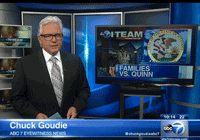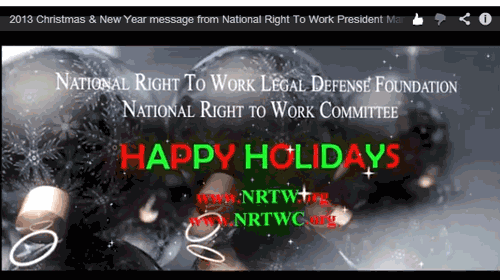High Court Ponders Compulsory Union Dues
Judges and Legislators Have Duty to Protect Employees’ Free Speech (click to download newsletter) Today roughly 20 states have laws on the books explicitly requiring all or…

Judges and Legislators Have Duty to Protect Employees’ Free Speech (click to download newsletter) Today roughly 20 states have laws on the books explicitly requiring all or…

[vsw id=”fEp2AGd-eY0″ source=”youtube” width=”425″ height=”300″ autoplay=”no”] From the National Right to Work Legal Defense Foundation Press Release: Chattanooga Volkswagen Workers File Federal Suit to Block Further Company and UAW Collusion Workers rely…

During his political career, [Illinois Governor] Quinn has taken nearly $5 million in campaign contributions from the service employees union. "A couple weeks after the executive order was signed and the union campaign began, there was Governor Quinn on TV with the SEIU banner behind him and the SEIU leadership behind him, and I couldn't help but think that this was an exchange, a deal," said Pam Harris.

What do forced-unionism and forced-dues funded political war chests create? Super citizens known as union bosses that get special favors that no other citizen will ever receive, but you are forced to pay for these government gifts to union bosses.

(Click to download) ‘Naked Power Grab’ Threatens Right to Work — Majority of Senators Obey Big Labor, Opt to Ignore Chamber Rules Obama NLRB ‘All in Place,’ ‘Ready to Go’ — Board Poised to Make…

[vsw id=”Zft83HZyxB0″ source=”youtube” width=”550″ height=”358″ autoplay=”yes”]…

With Wisconsin state worker’s given the choice whether to pay union dues, some unions are failing to get enough support to re-certify, the Examiner reports: Wisconsin Association for Correctional Law Enforcement and the education unit of Council 24 of the American…
The National Labor Relations Act (NLRA), the principal federal law regulating employer-employee relations in America’s private sector, purports to uphold the right to “form, join or assist labor organizations” and also “the right to refrain from” forming, joining or assisting…

From an extensive Al Jazeera America article about the National Right to Work’s Unite Here Local 355 v. Martin Mulhall and Mardi Gras Gaming ( a case that could end card-check forced unionism as we know it): Mulhall, said…